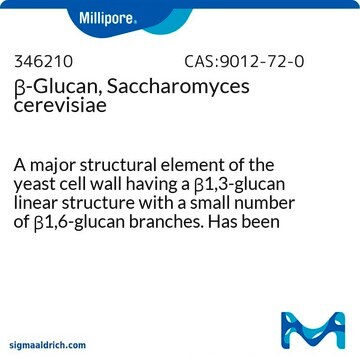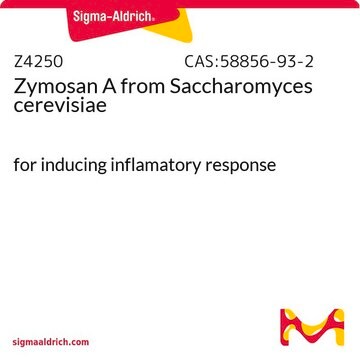YSC1
Yeast from Saccharomyces cerevisiae
Type I
Synonym(s):
(Bakers yeast)
Sign Into View Organizational & Contract Pricing
All Photos(3)
About This Item
UNSPSC Code:
12352202
NACRES:
NA.81
Recommended Products
biological source
Saccharomyces cerevisiae
type
Type I
form
powder or solid
application(s)
food and beverages
microbiology
storage temp.
2-8°C
General description
Yeast from Saccharomyces cerevisiae (Baker′s yeast) is the oldest microbial starter. It is a facultative anaerobe.
Application
Yeast from Saccharomyces cerevisiae has been used:
- as a biocatalyst for the anode of yeast microbial fuel cell
- for the production of ethanol for fuel use
- to prepare yeast extract
Biochem/physiol Actions
Yeast from Saccharomyces cerevisiae (Baker′s yeast) is used as a protein supplement, energy booster and immune enhancer. It serves as a dough leavening agent in bread production by converting the fermentable sugars to CO2 and ethanol. Baker′s yeast exhibits aroma, anti-molding and nutritive properties. It acts as a cell factory.
Caution
Autolyzes in aqueous buffer at 37 °C.
Preparation Note
Dried to avoid inactivation of enzymes.
Storage Class Code
11 - Combustible Solids
WGK
WGK 3
Flash Point(F)
Not applicable
Flash Point(C)
Not applicable
Personal Protective Equipment
dust mask type N95 (US), Eyeshields, Gloves
Certificates of Analysis (COA)
Search for Certificates of Analysis (COA) by entering the products Lot/Batch Number. Lot and Batch Numbers can be found on a product’s label following the words ‘Lot’ or ‘Batch’.
Already Own This Product?
Find documentation for the products that you have recently purchased in the Document Library.
Customers Also Viewed
Enhanced ethanol production via electrostatically accelerated fermentation of glucose using Saccharomyces cerevisiae
Mathew AS, et al.
Scientific Reports, 5, 15713-15713 (2015)
A microbial biofuel cell with an air-breathing cathode for in vivo glucose sensing applications
Lee JW
Analytical Methods : Advancing Methods and Applications, 7(8), 3324-3326 (2015)
Rebeccah J Katzenberger et al.
G3 (Bethesda, Md.), 6(12), 4151-4166 (2016-10-19)
Outcomes of traumatic brain injury (TBI) vary because of differences in primary and secondary injuries. Primary injuries occur at the time of a traumatic event, whereas secondary injuries occur later as a result of cellular and molecular events activated in
Mark van Zee et al.
Proceedings of the National Academy of Sciences of the United States of America, 119(4) (2022-01-21)
Production of high-energy lipids by microalgae may provide a sustainable energy source that can help tackle climate change. However, microalgae engineered to produce more lipids usually grow slowly, leading to reduced overall yields. Unfortunately, culture vessels used to select cells
Bread dough and baker's yeast: An uplifting synergy
StruyfN, et al.
Comprehensive Reviews in Food Science and Food Safety, 16(5), 850-867 (2017)
Our team of scientists has experience in all areas of research including Life Science, Material Science, Chemical Synthesis, Chromatography, Analytical and many others.
Contact Technical Service












